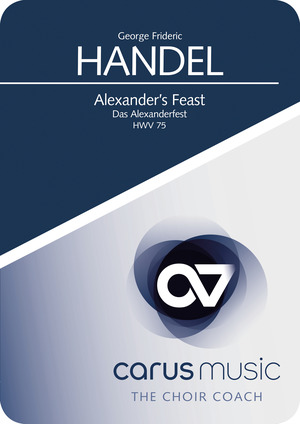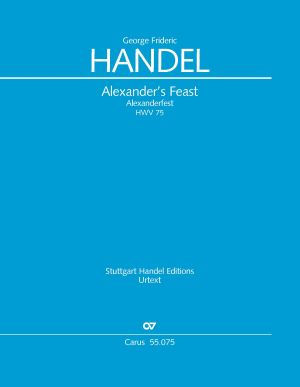
Alexander's Feast
Ode. Version of the first performance and version of 1751 HWV 75, 1736/1751
Avec l’oratorio Alexander’s Feast, Händel ouvre la saison des oratorios avec faste en 1736. Dans la première partie, le texte représente le pouvoir de la musique à partir de la célébration de la victoire d’Alexandre le Grand. La musique est donc polyphonique, avec de larges coloratures et des tempi rapides. Cette interprétation musicale et raffinée du texte donne justement ce charme sonore si particulier, mais il s’agit aussi des passages difficiles qui sont de véritables défis pour les choristes.
Il suffit de s'exercer. Partout. A tout moment.
Que ce soit à la maison sur votre tablette ou votre PC ou en déplacement sur votre smartphone : avec carus music, the Choir Coach, vous avez toujours vos œuvres chorales avec vous pour vous entraîner ! Avec l'application chorale de carus music, vous pouvez écouter votre partition ainsi qu'un enregistrement de première qualité sur n'importe quel appareil et vous entraîner facilement à votre propre partie de chœur avec un coach. Avec carus music, la préparation de vos concerts est facile, efficace et amusante à maîtriser !
Interprètes: Simone Kermes (soprano), Virgil Hartinger (tenore), Konstantin Wolff (basso) – Collegium Cartusanium, Kölner Kammerchor – Peter Neumann
Sommaire
-
Compositeur
Georg Friedrich Händel
| 1685-1759George Frideric Handel put his exceptionally versatile compositional abilities to the test at an early age. After moving to London in 1712, where he was appointed Composer of Musick for His Majesty’s Chapel Royal in 1723, he wrote numerous masterpieces for the royal court as well as his major opere serie. For many years he enjoyed triumphant successes with his operas, which were sung by outstanding performers, with serenades, and later also with oratorios such as Saul and Israel in Egypt. Over the years Handel’s reputation grew far beyond the city where he worked; some of his choral works, particularly Messiah, have enjoyed a performance tradition which remains unbroken to this day, and are sung by choirs throughout the world. Plus d'information sur la personne
-
Ensemble
Kölner Kammerchor
-
Ensemble
Collegium Cartusianum
The period instrument ensemble Collegium Cartusianum, founded in 1988 as successor to the Barockorchester Koln, has a repertoire ranging from Monteverdi to Brahms. The ensemble’s participation in the complete recording of Wolfgang Amadeus Mozart’s masses conducted by Peter Neumann earned it an outstanding reputation, subsequently confirmed by many concerts, radio broadcasts and CD recordings. As well as collaborating with the Kolner Kammerchor, the Collegium Cartusianum has also received international acclaim for its performances of J. S. Bach’s Orchestral Suites as well as Mozart and Beethoven symphonies. With Mozart’s Il Re Pastore, Mendelssohn’s St. Paul and Elijah, and Dvo?ak’s Requiem the orchestra has extended its repertoire to include opera and romantic works. It has appeared at many leading festivals in Europe and Japan, recently at the Leipzig Bach Festival with a Handel-Bach program, with Handel’s Serenata Aci, Galatea e Polifemo in Krakow and Essen at the second “Fest fur Alte Musik” in Cologne in February 2012. Plus d'information sur la personne
-
Chef d'orchestre
Peter Neumann
| 1940In recent years Peter Neumann, born in Karlsruhe, has made a name for himself particularly as a conductor of Handel’s music. This is demonstrated both by the concert series “250 Years Handel Oratorios” which he initiated – performing nine music dramas in accordance with Handel’s concert schedule of 1749–1752 – and by his numerous CD recordings. He has performed masterworks from vocal and orchestral music in the European musical capitals and at many renowned festivals, ranging from Monteverdi’s L’Orfeo and Vespers for the Blessed Virgin (Palais Garnier, Paris) through J. S. Bach’s passions (last in Moscow, Oslo and Versailles) and Mass in B minor (BBC Proms) to Debussy’s Le Martyre de Saint Sébastien at the MusikTriennale in Cologne. 2010, Peter Neumann and his ensembles Kolner Kammerchor and Collegium Cartusianum were guests at the Rheingau Music Festival with Schumann’s Das Paradies und die Peri and at the Schumann Festival in Dusseldorf as well as the Leipzig Bach Festival in 2011. In June 2012 he made his highly acclaimed debut at the Cologne Opera with Handel’s Alcina. As a guest conductor, Neumann has collaborated with, among others, ChorWerkRuhr, the Netherlands Chamber Choir, the SWR Vokalensemble Stuttgart, the NDR Choir, the Schola Cantorum Tokyo, the Concertgebouw Orchestra Amsterdam, the Jerusalem Symphony Orchestra, the Junge Deutsche Philharmonie and Concerto Koln. Highlights of his extensive discography include the complete recording of Mozart’s masses (Gramophone “Crown of Crowns”), Schutz’s Musical Vesper, Schumann’s Missa sacra (Diapason d’Or) and recordings of Bach’s St. John Passion and Handel’s Alexander’s Feast and Brockes Passion (Carus). Plus d'information sur la personne
-
Solist - basse
Konstantin Wolff
Konstantin Wolff studied with Donald Litaker at the Hochschule für Musik in Karlsruhe. He won the Felix Mendelssohn Bartholdy Prize from the Stiftung Preußischer Kulturbesitz, was awarded a scholarship by the German National Academic Foundation and made his opera debut in 2005 at the Opera National de Lyon under William Christie in Monteverdi’s L’incoronazione di Poppea. His concert repertoire ranges from the early baroque to the 20th century. He has performed with conductors including Gerd Albrecht, Alun Francis, Riccardo Chailly, Ton Koopman, René Jacobs, Claudio Abbado, Sir Simon Rattle and Nicholas McGegan. His first solo CD, a recording of Lieder to texts by Victor Hugo, has been enthusiastically received. Plus d'information sur la personne
Questions fréquentes sur l'œuvre
 Il n'y a pas encore de questions et réponses concernant cette œuvre ou vous n'avez pas trouvé la réponse à votre question sur l'œuvre ? Cliquez ici et envoyez votre question spécifique à notre service clients.
Il n'y a pas encore de questions et réponses concernant cette œuvre ou vous n'avez pas trouvé la réponse à votre question sur l'œuvre ? Cliquez ici et envoyez votre question spécifique à notre service clients.






